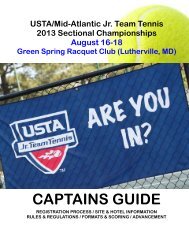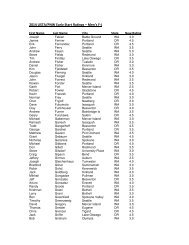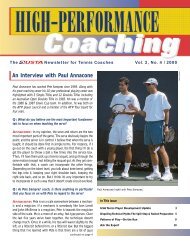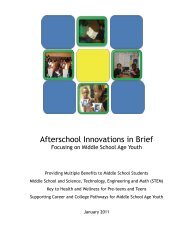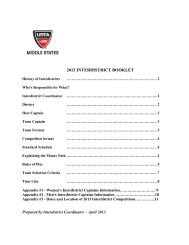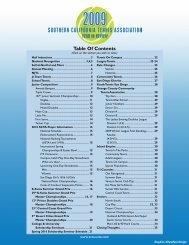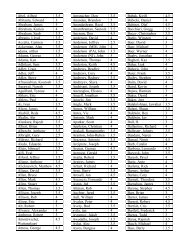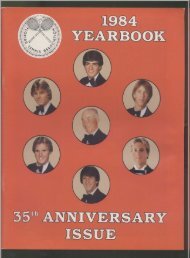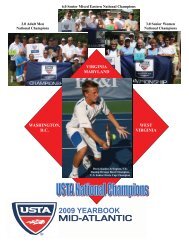FRIEND AT COURT 2010 - USTA.com
FRIEND AT COURT 2010 - USTA.com
FRIEND AT COURT 2010 - USTA.com
You also want an ePaper? Increase the reach of your titles
YUMPU automatically turns print PDFs into web optimized ePapers that Google loves.
19. Player who has been overruled twice shall thereafter be penalized under<br />
the Point Penalty System. If the Solo Chair Umpire and Roving<br />
Umpires have overruled a player or doubles team twice, the Umpire<br />
shall penalize each subsequent overrule under the ITA Point Penalty<br />
System. The failure to have an appeal upheld is not treated as an<br />
overrule.<br />
20. Excessive appeals for the apparent sake of disrupting play. A Solo Chair<br />
Umpire shall caution any player making excessive appeals for the<br />
apparent sake of disrupting play. Thereafter, if the Solo Chair Umpire<br />
determines that the player is making appeals for the apparent sake of<br />
disrupting play, he may penalize the player under the ITA Point<br />
Penalty System.<br />
C. Service and Service Returns<br />
1. No more than twenty seconds between points. Both the server and<br />
receiver must be ready to begin the next point within twenty seconds<br />
of when the ball went out of play. Each player has the right to the full<br />
twenty seconds to prepare for the next point.<br />
2. Server’s appeal of a first serve that receiver calls good. The server (or<br />
server’s partner in doubles) may make a first volley or half-volley of<br />
the return of an out first serve which was played before appealing to<br />
the Chair Umpire or Roving Umpire for an overrule. But if the server<br />
(and the server’s partner in doubles) remains in the back court, the<br />
appeal must be made before hitting the ball.<br />
• If the appeal is granted, the server gets a second serve.<br />
• If the appeal is not granted, then the point goes to the receiver.<br />
A server whose appeal is denied is not subject to penalty under the ITA<br />
Point Penalty System by virtue of the failure of his appeal.<br />
3. Feinting, changing position, and intentional distraction. A player may feint<br />
with the body while the ball is in play. A player may change position at any<br />
time, including while the server is tossing the ball. Any movement or<br />
sound that is made solely to distract an opponent, including, but not<br />
limited to, waving the arms or racket or stamping the feet, is not allowed.<br />
The receiver’s partner shall not stand in the receiver’s service box before or<br />
during the serve. If a player does so, he shall be warned that if he does<br />
so again he is subject to being penalized under the ITA Point Penalty<br />
System.<br />
4. Player should not return obviously out serves. A player should not<br />
return a serve that is obviously out even when the return is<br />
ac<strong>com</strong>panied by an “out” call. This is a form of rudeness or<br />
gamesmanship. A player may return a fast serve that just misses the<br />
line inasmuch as the return is often a matter of self-protection.<br />
5. Receiver who corrects his fault call to good loses the point. If the<br />
receiver returns a ball and simultaneously calls a fault and then<br />
changes his call to good, then the receiver loses the point because of<br />
interference of play, even if the return is good.<br />
6. If receiver is ready, then his partner is deemed ready. If the receiver has<br />
indicated that he is ready and the server serves an ace, the receiver’s<br />
partner cannot claim a let because he was not ready. The receiver’s<br />
indication of being ready is tantamount to indicating that his team is ready.<br />
INTERCOLLEGI<strong>AT</strong>E TENNIS ASSOCI<strong>AT</strong>ION (ITA) REGUL<strong>AT</strong>IONS 247



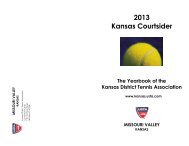
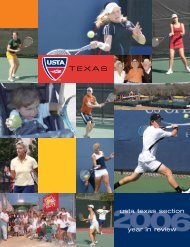
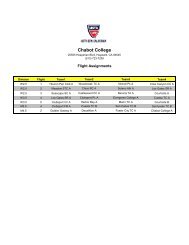

![COMPLETE - 2013 Tournament Schedule [11_20_12] - USTA.com](https://img.yumpu.com/21906454/1/190x245/complete-2013-tournament-schedule-11-20-12-ustacom.jpg?quality=85)

